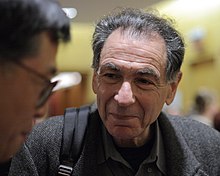Paul Forman | |
|---|---|
 Forman at the 2007 History of Science Society meeting | |
| Born | 1937 (age 86–87) |
| Occupation | Historian of science |
Paul Forman (born 1937) is a historian of science and is the retired curator of the Division of Medicine and Science at the National Museum of American History. Forman's primary research focus has been the history of physics, in which he has helped pioneer the application of cultural history to scientific developments.
Forman is especially known for two controversial historical theses. The first (often called "the Forman thesis") regards the influence of German culture on early interpretations of quantum mechanics; Forman argued that the culture of Weimar Germany, through its emphasis on acausality, individuality and visualizability (Anschaulichkeit), contributed to the acceptance and interpretation of quantum mechanics.[1] Forman's second thesis regards the influence of military funding on the character and course of scientific research; he argued that during World War II and the Cold War, the massive scale of defense-related funding prompted a shift in physics from basic to applied research, spurring considerable historical research on the effects of the military funding of science.[2] Forman's recent work focuses on "characterization of the modern/postmodern transition in science, society, and culture."[3]
- ^ Forman, Paul. "Weimar culture, causality, and quantum theory: adaptation by German physicists and mathematicians to a hostile environment," Historical Studies in the Physical Sciences, Vol. 3, pp 1-115. 1971. Forman expanded on his original argument in: Forman, Paul. "Kausalität, Anschaullichkeit, and Individualität, or How Cultural Values Prescribed the Character and Lessons Ascribed to Quantum Mechanics," in Society and Knowledge, eds. Nico Stehr and Volker Meja. Transaction Books, 1984: pp 333-347.
- ^ Forman, Paul. "Behind quantum electronics: National security as basis for physical research in the United States, 1940-1960," Historical Studies in the Physical and Biological Sciences, Vol. 18, Pt. 1, 1987, pp 149-229.
- ^ See "The Primacy of Science in Modernity, of Technology in Postmodernity, and of Ideology in the History of Technology," "History and Technology", Vol. 23, No. 1/2, pp. 1-152, March/June 2007 National Museum of American History: Paul Forman Archived 2011-06-30 at the Wayback Machine, accessed September 25, 2006